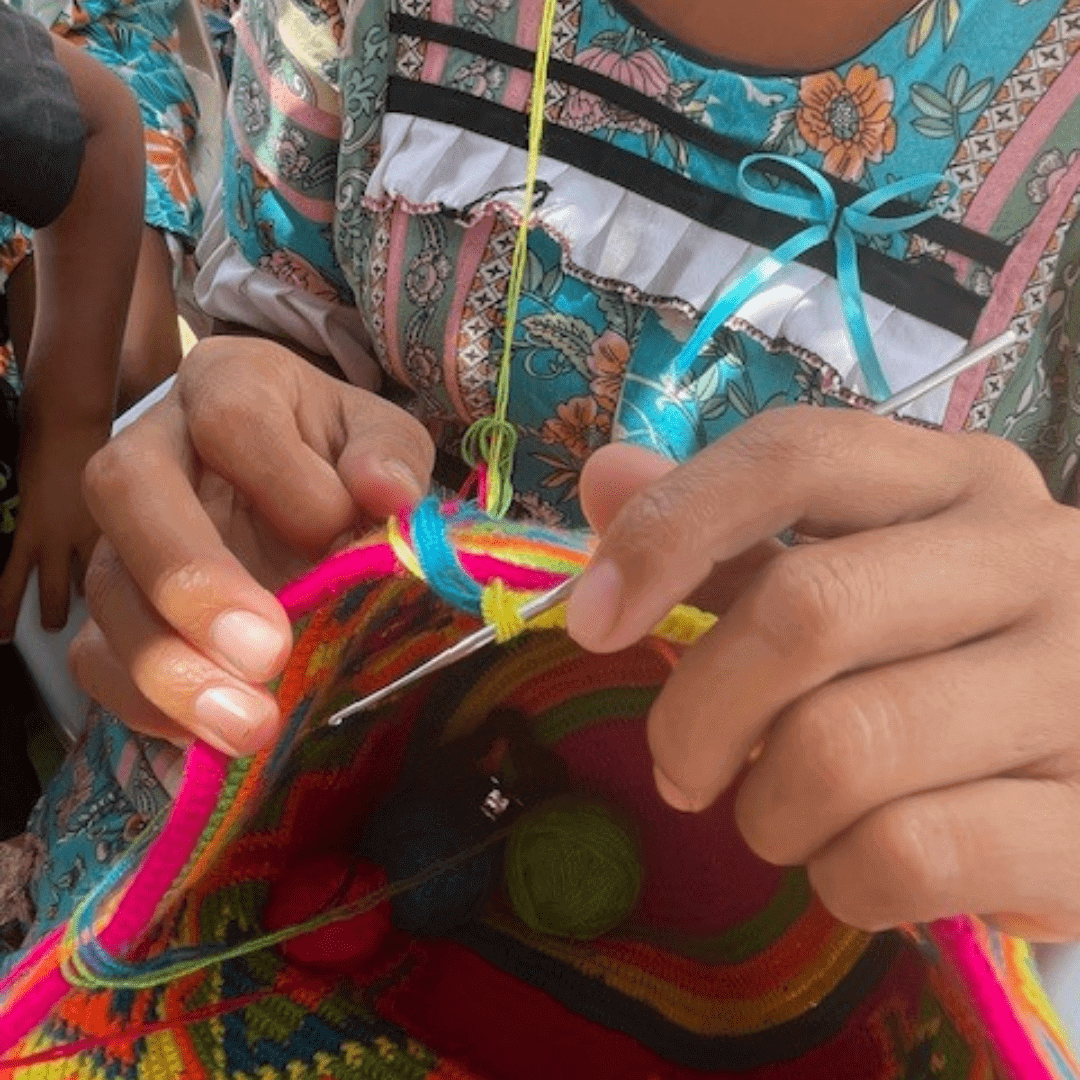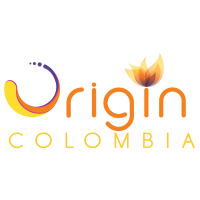
How Wayuu Women Use Handmade Colombian Bags to Fight Poverty
Share
The Wayuu people of La Guajira, Colombia, face poverty challenges while preserving their traditions. Handmade Colombian bags, crafted by Wayuu artisans, not only represent cultural heritage but also help fight poverty, giving families a sustainable source of income.
The Wayuu women belong to the Wayuu people, an Indigenous community of over 300,000 individuals living in the arid La Guajira Peninsula in northern Colombia, near the border with Venezuela. Despite their vibrant cultural heritage, Wayuu women face serious challenges such as extreme poverty, drought, displacement, and violence. They are often marginalized, with limited access to education or stable job opportunities.
“They face many challenges, including extreme poverty, drought, dispossession, and violence”

( Rancheria, Wayuu house)
Who Are the Wayuu People
The Wayuu people are an Indigenous community with deep roots in La Guajira, the northernmost region of Colombia. Since the arrival of Spanish colonists, the Wayuu have preserved their cultural identity through centuries of resilience and adaptation. Their main language, Wayuunaiki, belongs to the Arawak language family, and their society is organized through matrilineal clans led by Wayuu women.
Strong community ties and traditional rituals are central to their way of life. Despite living in an arid and unforgiving climate, the Wayuu people have adapted by building rancherias—simple homes made of wood and dried palm leaves. Their traditional economy revolves around agriculture, raising livestock, and creating artisanal crafts like Colombian woven bags.
In recent years, weaving Wayuu bags has become a key source of income, especially for Wayuu women. These handmade Colombian bags, rich in cultural meaning, are sold in local markets or through intermediaries. Unfortunately, most artisans receive low compensation for their work, making it hard to earn a fair living.
Beyond economic struggles, the Wayuu community faces serious challenges in health and education. La Guajira has one of the highest infant mortality rates in Colombia, and access to healthcare and education remains limited. Many Wayuu children leave school early due to poverty and lack of resources, further deepening the cycle of hardship.
The Impact of Extreme Poverty on Wayuu Women
In most Wayuu communities, women are the primary caretakers, responsible for providing food, water, and shelter for their families. Wayuu women carry an immense burden, often doing so with limited resources and few economic opportunities.
One of the biggest challenges they face is access to clean water. La Guajira is one of the driest regions in Colombia, and the scarcity of water is a constant struggle. Many women must walk long distances each day under the scorching sun to collect water for their families. This exhausting task not only affects their health but also exposes them to water-borne diseases that can be life-threatening.
The lack of basic services like clean water, combined with extreme poverty, puts daily survival at the center of life for many Wayuu women. Despite these conditions, they continue to carry on with strength, finding ways to support their families—often through the creation of handmade Wayuu bags and other crafts that connect them to the broader world.

Health, Education, and the Daily Struggles of Wayuu Women
In La Guajira, the infant mortality rate is among the highest in Colombia. Many babies die from preventable illnesses due to the lack of medical care. Wayuu women also face a high risk during childbirth, as access to trained healthcare professionals and essential medical equipment is often nonexistent in remote areas.
Access to healthcare is a constant challenge. Many Wayuu women live in isolated regions and cannot reach clinics for prenatal care, vaccinations, or emergency services. Without support, even basic medical needs become out of reach.
Poverty also takes a heavy toll on education. Many Wayuu children drop out of school due to financial hardship, lack of access to materials, or long travel distances. Girls are especially affected, often expected to stay home and help with household tasks or take care of younger siblings. These traditional roles make it harder for them to continue their studies and break free from the cycle of poverty.
On top of these barriers, Wayuu women have limited access to legal protection and social services. Discrimination based on gender and ethnicity further restricts their ability to access education, health services, or fair economic opportunities.
Yet despite all this, Wayuu women continue to show resilience. Many have joined community-led efforts to improve access to water, health, and education. Others have launched small businesses, weaving handmade Wayuu bags as a way to support their families and gain independence.
But they cannot do it alone. These efforts need greater visibility, support, and resources to grow—so that Wayuu women can not only survive, but thrive.
Handmade Wayuu Bags: Empowering Wayuu Women

(Wayuu woman weaving)
Wayuu Bags as a Source of Empowerment
Wayuu bags are not just beautiful — they carry the unique artistry and cultural wisdom of Wayuu women. Every pattern, knot, and vibrant color reflects generations of tradition passed down through the hands of mothers and grandmothers.
For many women in La Guajira, crafting these handmade bags has opened doors to something long denied: opportunity. The Wayuu bag industry has become a powerful tool for economic empowerment, helping women earn an income, support their families, and reclaim agency over their futures.
By partnering with fair trade and ethical fashion platforms, Wayuu women receive fair compensation for their work — not pennies from middlemen, but payment that honors their time and skill. These earnings make a real difference. They help cover essentials like food, school supplies, or medical care — basic needs that are otherwise out of reach in many Wayuu communities.
But this movement is about more than income. It is about preserving a way of life. Every Wayuu bag that reaches the hands of someone across the world carries the values, resilience, and creative soul of a people who have held onto their identity through centuries of struggle.
Buying a Wayuu bag is not just a fashion choice — it is a gesture of solidarity and support. It is a way to help protect culture, empower women, and bring visibility to stories that matter.

Beyond the Bag: Weaving Strength and Independence
The skills passed down through weaving go far beyond making Wayuu bags. These women also create clothing, hammocks, and everyday essentials — all using the same techniques rooted in their ancestral knowledge. Each stitch is part of a living tradition that blends creativity with resilience.
But something even more powerful has emerged from this craft — a shift in the role of Wayuu women within their communities. Thanks to the growing visibility and value of their work, many women have gained financial independence and a stronger voice in tribal decisions. What was once seen as “women’s work” is now a vital part of the local economy.
Through their art, Wayuu women are redefining their place in society. They are not only preserving culture — they are transforming it. The weaving that once held stories is now also weaving change.
Origin Colombia: Supporting Wayuu Women and Their Families
At Origin Colombia, we believe fashion can be a force for good. Our mission is simple — to empower Wayuu women through fair trade and create real, sustainable opportunities for their families.
We work directly with Wayuu artisans, paying fair prices for their handmade bags and ensuring a steady income that helps them care for their homes and children. More than a business, it is a partnership rooted in respect.
By creating a global market for these beautiful handmade bags, we help keep Wayuu culture alive. Every sale supports the weaving tradition, making sure it continues to be passed down from mother to daughter.
We are also committed to ethical and sustainable fashion. We minimize our environmental footprint and focus on conscious practices that protect both people and planet.
A Personal Reflection
The story of the Wayuu people and their handmade bags is more than just culture — it’s resilience, beauty, and survival woven into every thread. At Origin Colombia, our connection with these women goes beyond business. It’s about trust, respect, and working together to preserve something truly special.
Every purchase you make supports a real woman, a real family, a real story. It helps carry forward a tradition that has shaped generations — and gives it a future.
By choosing fair trade, you’re not just buying a bag. You’re standing beside the Wayuu women and saying their art, their voice, and their journey matter. And that, to us, means everything.
